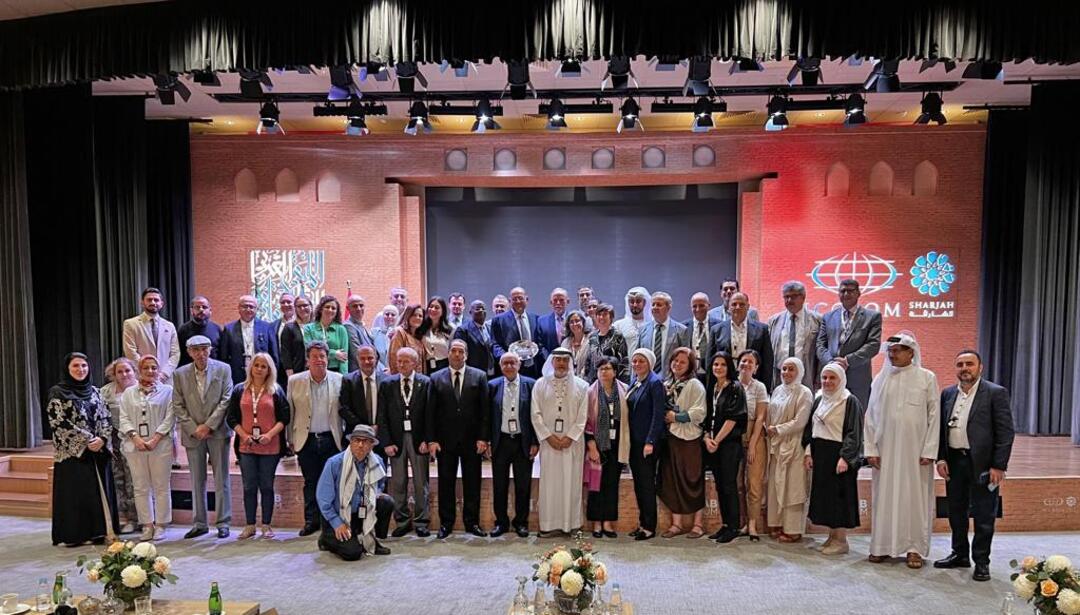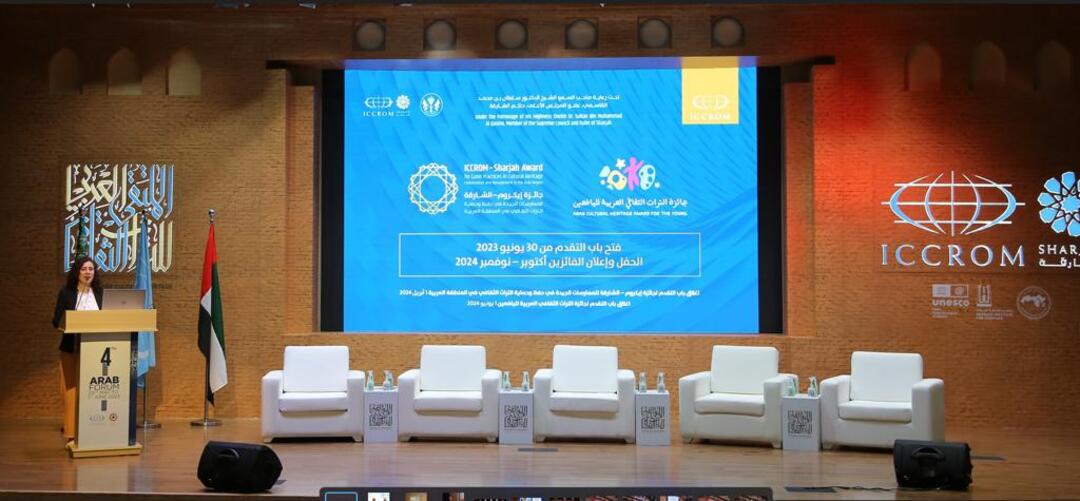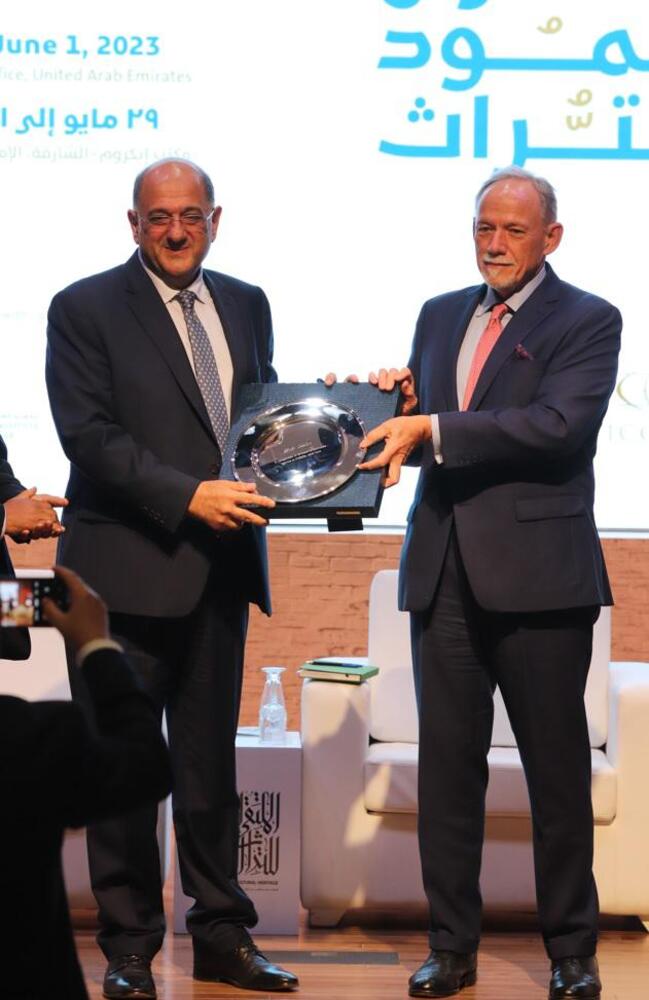-
4th Arab Forum for Cultural Heritage concluded with a set of recommendations

04 June 2023 - Sharjah (United Arab Emirates): Under the patronage of His Highness Sheikh Dr Sultan bin Mohammed Al Qasimi, Member of the Supreme Council of the United Arab Emirates and Ruler of the Emirate of Sharjah, the 4th Arab Forum for Cultural Heritage (2023) concluded its activities in Sharjah, UAE.
The three-day forum, organized by the Regional Office for the Conservation of Cultural Heritage (ICCROM-Sharjah), in cooperation with the Arab League Educational, Cultural and Scientific Organization (ALECSO) and the Sharjah Institute for Heritage, was held at ICCROM-Sharjah under the title “Culture of Built Environment (Omran) and Resilience of Heritage.”
The forum included many interventions, presentations, and discussion sessions, in which a number of regional and international experts, stakeholders, and those interested in the field of the built environment and the preservation of cultural heritage in the Arab region and the world participated. The interventions focused on five main themes: the notion of built environments (Omran); the importance of the culture of built heritage in enhancing communities’ role in sustaining cultural heritage; cultural preparedness as a tool for the resilience of heritage; community-based adaptation and culture-based resilience; and integrating sociocultural dimensions into cultural heritage policies to achieve cohesion, inclusiveness, and equality while sustaining and preserving historic environments.
Dr Weber Ndoro, Director of ICCROM, said at the end of the third day of the forum that one of the important and exciting things he witnessed is the exchange of ideas and experiences through presentations and discussion sessions. "We hope that this debate and discussion between the participants will continue in the future, and I call on this occasion to all participants, as well as ICCROM-Sharjah, to continue this communication and constructive debate." He also stressed the importance to evaluate the projects and interventions to ensure that they are done properly and accurately. He called to follow up on projects in a systematic and continuous way. "We cannot predict the future, but we can enable it," he added.

On the first day, all sessions focused on the first and second themes, while the presentations and discussions focused on the second day on the third and fourth themes. The discussions focused on the third day on the fifth and final theme. On the fourth and final day, the forum concluded with a session dedicated to presenting and discussing a set of results and recommendations suggested by the participants after three days of communication and constructive discussions. The participants agreed that these recommendations should be included in a special platform to be established in order to carry out further discussion and research in order to reach the final recommendations with the support of previously available sources and materials.
Among the initial recommendations for governments and member states are to establish a robust local and national coordination mechanism for disaster resilience; prepare risk assessments based on holistic, participatory processes to use them as a basis for planning and development of the historic built environment and long-term goals; carry out risk-informed territorial planning, development and develop tools based on risk assessments, taking in consideration vulnerable populations; build institutional capacities related to resilience of built heritage to acquire the adequate knowledge to execute their roles and increase the resilience of historic areas; develop strategies for post-disaster recovery, rehabilitation, and reconstruction ensuring that they are aligned with long-term planning and provide an improved built environment and increased resilience for the affected living community; and many others.
Other recommendations and tools suggested to be adopted and developed by built heritage experts and concerned professionals include the establishment of an inventory and a baseline of the current level of disaster resilience concerning cultural heritage (crisis mapping of the built environment in the Arab region); identify funding opportunities for cultural heritage preservation; create or promote knowledge-sharing activities between cities, and involving the private sector in planning and implementation; create opportunities to build capacities within professionals, decision-makers, and civil society, emphasizing professional and continuing education; enable dialogue and consensus among all parties responsible for cultural heritage protection, disaster risk reduction, and related areas; engage communities (particularly minorities and vulnerable population groups) in the decision-making process related to cultural heritage protection and disaster resilience; and many others.
Dr Zaki Aslan, Director of ICCROM-Sharjah, concluded the forum by emphasizing the importance of these recommendations and the need to discuss, follow up and implement them further in coordination with local, regional, and international partners. He stressed the importance of the culture of the built environment (Omran) in preserving cultural heritage and enhancing its resilience to face the challenges of the current period. "This forum is considered a significant opportunity to engage a wide range of regional and international experts and experiences. At this stage, we must take advantage of this opportunity and continue the meeting and discussion to reach the final results and recommendations that would unify our efforts to address the challenges facing the cultural heritage in the Arab region”, Dr. Aslan said.

At the end of the forum, Dr John Robbins, Chairperson of the Council of ICCROM, and Dr Weber Ndoro honored Dr Aslan, in recognition of the efforts he made over the course of 20 years in the service of cultural heritage in the region. In turn, Dr Aslan expressed his gratitude for this honor and thanked the Chairperson and Director of ICCROM as well as all colleagues working at the institution who accompanied him during this period and contributed to achieving this success. "In the journey of life learning, this job taught me that you can be kind but also strong, empathetic but also determined, and optimistic but also pragmatic", Dr Aslan concluded.
On the sidelines of the forum, the 4th cycle of the ICCROM-Sharjah Award for Good Practices in Cultural Heritage Conservation and Management in the Arab Region (2023-2024), and the 3rd cycle of the Arab Cultural Heritage Award for the Young are announced. Participants are invited to submit their projects starting from 30 June 2023. The winning projects will be announced in the fall of next year 2024.
--
For more information, please contact:
Mohamad Adham Alsayed
Media and Communication Consultant
Tel: 0033-623814518
e-mail: [email protected]
Shireen Sahouri
Project Associate – Heritage Advocacy and Development
ICCROM Sharjah
Tel: 00971-65552250
e-mail: [email protected]
About ICCROM-Sharjah
ICCROM-Sharjah is a regional conservation centre founded by ICCROM and the Government of the Emirate of Sharjah, the United Arab Emirates, where it has been based since its inception in 2012. ICCROM-Sharjah is a continuation of ICCROM’s ATHAR programme, launched in 2004, which is dedicated to protecting cultural heritage in the Arab region and broadening access, appreciation and understanding of its rich history.
You May Also Like
Popular Posts
Caricature
BENEFIT Sponsors BuildHer...
- April 23, 2025
BENEFIT, the Kingdom’s innovator and leading company in Fintech and electronic financial transactions service, has sponsored the BuildHer CityHack 2025 Hackathon, a two-day event spearheaded by the College of Engineering and Technology at the Royal University for Women (RUW).
Aimed at secondary school students, the event brought together a distinguished group of academic professionals and technology experts to mentor and inspire young participants.
More than 100 high school students from across the Kingdom of Bahrain took part in the hackathon, which featured an intensive programme of training workshops and hands-on sessions. These activities were tailored to enhance participants’ critical thinking, collaborative problem-solving, and team-building capabilities, while also encouraging the development of practical and sustainable solutions to contemporary challenges using modern technological tools.
BENEFIT’s Chief Executive Mr. Abdulwahed AlJanahi, commented: “Our support for this educational hackathon reflects our long-term strategic vision to nurture the talents of emerging national youth and empower the next generation of accomplished female leaders in technology. By fostering creativity and innovation, we aim to contribute meaningfully to Bahrain’s comprehensive development goals and align with the aspirations outlined in the Kingdom’s Vision 2030—an ambition in which BENEFIT plays a central role.”
Professor Riyadh Yousif Hamzah, President of the Royal University for Women, commented: “This initiative reflects our commitment to advancing women in STEM fields. We're cultivating a generation of creative, solution-driven female leaders who will drive national development. Our partnership with BENEFIT exemplifies the powerful synergy between academia and private sector in supporting educational innovation.”
Hanan Abdulla Hasan, Senior Manager, PR & Communication at BENEFIT, said: “We are honoured to collaborate with RUW in supporting this remarkable technology-focused event. It highlights our commitment to social responsibility, and our ongoing efforts to enhance the digital and innovation capabilities of young Bahraini women and foster their ability to harness technological tools in the service of a smarter, more sustainable future.”
For his part, Dr. Humam ElAgha, Acting Dean of the College of Engineering and Technology at the University, said: “BuildHer CityHack 2025 embodies our hands-on approach to education. By tackling real-world problems through creative thinking and sustainable solutions, we're preparing women to thrive in the knowledge economy – a cornerstone of the University's vision.”
opinion
Report
ads
Newsletter
Subscribe to our mailing list to get the new updates!






















